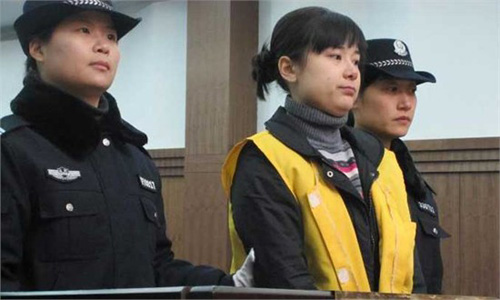
Wu Ying stands trial for financial fraud and is sentenced to death in December 18, 2009.
(Ecns.cn)--The Supreme People's Court (SPC) of China is currently reviewing the death sentence of Wu Ying, formerly China's sixth-richest woman who was convicted in a financial fraud case, the state-run Xinhua News Agency quoted SPC spokesman Sun Jungong on Tuesday.
Sun said at a press conference that the SPC will, based on legal procedures, scrutinize the facts and evidence during the review process and prudently handle the case according to law.
Wu, the 31-year-old former owner of the Zhejiang-based Bense Holding Group, was sentenced to death in 2009 by the Jinhua City Intermediate People's Court in Zhejiang Province for a Ponzi scheme, revealed the China Daily.
Promising high returns for investors, she illegally raised 770 million yuan (US$122 million) from 11 lenders from 2005 to 2007. Of that sum, 380 million yuan (US$ 60 million) was left unpaid.
Her appeal to overturn the death sentence was rejected by the Zhejiang High People's Court last month for the reason that she had, according to the verdict, "brought huge losses to the nation and people with her serious crimes and should therefore be severely punished."
According to China's criminal code, Wu will face capital punishment if the top court upholds the judicial decision.
"It was purely fictitious to say that Wu had jeopardized the country's interests. She had never borrowed a penny from the bank. The local banks might get hurt since they received fewer deposits from the locals," Wu's father argued.
He added that if they took Wu's assets into consideration—which were estimated to be worth 170 million yuan by the court—Wu would only owe about 200 million yuan.
Yet Wu assessed her property at over 500 million yuan, and claimed that the police had undervalued her belongings by a large margin.
At this, local police cited a hotel formerly owned by Wu as an example, explaining that "now it seems quite worthwhile to buy her hotel at a rather low price. But in 2008, when the whole world was mired in the financial crisis, nobody was interested in the hotel."
Wu's trial soon drew extensive attention from the media, and the fair-skinned woman's fate has roused wide public support and pleas to spare her life.
Speculation has swirled around both the suitability of the charge and whether capital punishment is too severe for a non-violent financial crime, pointed out the China Daily.
Zhang Sizhi, a well-known lawyer, wrote an open letter to the top court and pleaded for re-consideration when it exerted its right of review, for there are still "reasonable doubts," such as the exact amount of money involved.
Zhang Yanfeng, Wu's lawyer, argued that the case does not even constitute the crime of financial fraud, a charge, according to China Daily, that requires fundraising from the general public by means of "swindling" for the purpose of illegal possession.
"Nine out of the eleven lenders are Wu's old friends, who should not be considered the general public," Yang Zhaodong, one of Wu's lawyers, added.
Xu Xin, a professor at the School of Law of the Beijing Institute of Technology, told the Global Times that "it is so ridiculous to sentence Wu Ying to death. She should not be sentenced to death before the financial system is completed."
Xu carried out a survey on his weibo (Twitter-like microblog) which revealed that 94 percent of around 20,000 respondents believed that Wu should not face the death penalty.
In addition, some industry celebrities such as property developers Ren Zhiqiang and Pan Shiyi, Li Kaifu (former Google China chief) and Wang Wei, an official at the Chinese Museum of Finance, have also questioned the sentence online.
Many are complaining that the current system should share certain responsibilities for illegal underground banking that is caused by the immature financial system, which makes it hard for private enterprises to raise capital through official channels, reported the Global Times.
A farmer's daughter, Wu started out with a single nail salon in 1997 and went on to expand her business interests to entertainment and property investments. As is common for private entrepreneurs in China, she had difficulty obtaining loans from banks and had to raise funds by other means. Unfortunately, her business had cash flow problems and she failed to pay back a debt to loan sharks in December of 2006.
Teng Biao, a human rights lawyer, pointed out that under the current financial system it is inevitable for the private business sector to commit "illegal fundraising."
"Without support from the banks, private businesses have to borrow money from the market. According to statistics, only 20 percent of short term bank loans go to private businesses. A bank survey shows that more than 90 percent of SMEs said they had failed to obtain loans from banks, and more than 62.3 percent of family businesses obtain their capital from the market," Teng was quoted by Global Voices, an international community of bloggers.
Sun Jungong noted in his remarks at the press conference that the case, in the capital circulation sector, was complicated and involved a huge amount of money, thus would be handled "with care."
Yet he did not say when the final decision would be handed down. China's criminal code does not specify an exact time window for the top court's final review of capital sentences, reported the Asian News Network.

Copyright ©1999-2011 Chinanews.com. All rights reserved.
Reproduction in whole or in part without permission is prohibited.